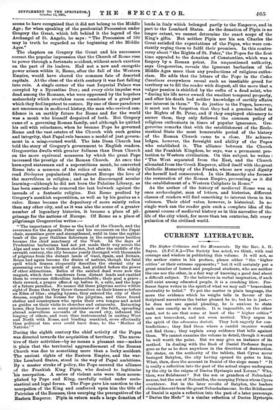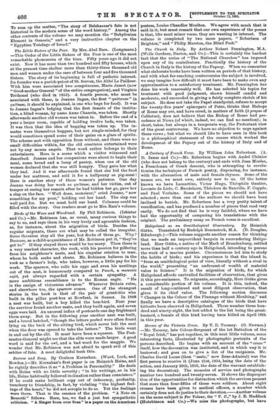CURRENT LITERATURE.
The Higher Criticism and the Monuments. By the Rev. A. H. Sayce. (S.P.C.K.)—The Society has acted, we think, with real courage and wisdom in publishing this volume. It will not, as the author states in his preface, please either " the ' higher critics' or their extreme opponents ; " but it will certainly put a great number of honest and perplexed students, who are neither the one nor the other, in a fair way of knowing a good deal about a difficult subject. To the believers in verbal inspiration, if such still exist among educated people, it is a crushing blow. Pro- fessor Sayce writes in the spirit of what we may call " benevolent neutrality to belief." To put the matter in plain language, the more the evidence which he weighs tells in favour of the Scriptural narratives the better pleased he is; but he is just,— he does not use special pleading, he is anxious to state each case exactly as it stands. It is impossible, on the other hand, not to see that some at least of the " higher critics" are not benevolent, and not even neutral. They argue in the spirit of the advocatus dtaboti. They look eagerly for con- tradictions; they find them where a candid inquirer would not find them ; they explain away evidence that tells against them. We cannot examine the volume in detail, though it would be well worth the pains. But we may give an instance of its method. In dealing with the Book of Daniel Professor Sayce goes as far as he does anywhere in the direction of destruction. He states, on the authority of the tablets, that Cyrus never besieged Babylon, the city having opened its gates to him. What, then, does the account in Daniel of the siege mean ? " It is really a reflection into the past of the actual sieges undergone by the city in the reigns of Darius Hystaspis and Xerxes." Who, then, was Belshazzar ? Not the son or grandson of Nebuchad- nezzar, but the son of Nabonidos, the usurping Prince whom Cyrus overthrew. But in the later revolts of Babylon, the leaders claimed descent from the great Nebuchadnezzar. So the Belshazzar of Daniel is again a reflection into the past of a later personage. "Darius the Mede" is a similar reflection of Darius Hystaspis.
To sum up the matter, "The story of Belshazzar's fate is not historical in the modern sense of the word history." Among the other contents of the volume we may mention the "Babylonian Element in Genesis," and a very instructive chapter on the " Egyptian Tutelage of Israel."



















































 Previous page
Previous page